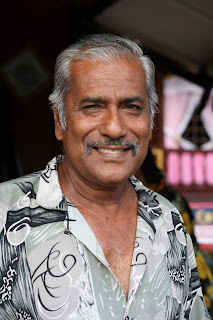 Aziz and Fatima
Aziz and FatimaJonker 88 (restaurant with traditional Malaccan food) was full of Chinese but it also proved Jason right. On my table I was first joined by a Malay Tourist guide called ‘Andrew’ and a Hong Kongese tourist. After they had finished, two Malay students joined the table and the next leg of my Malaccan journey opened up.
Aziz and Fatima had a car and they showed me a Malay experience called ‘jalan, jalan’. I was staying at a hostel called ‘Jalan, jalan’ and I translated it as ‘road, road’ and then ‘crossroad’. They laughed. Like the sounds, ‘jalan, jalan’ is fun and describes many a traveller, whilst Aziz and Fatima also used it for ‘window-shopping’. To me, it meant travel for fun, without purpose.
Aziz drove us to the seaside first where lots of Malay were flying kites and then onto a beach. It was cooler and more spacious than the city. Aziz and Fatima were very bubbly and asked lots of questions about London. They both want to travel when they finished university.
 Milik Ahmed, owner of the house
Milik Ahmed, owner of the houseAfter, Aziz took us to a Malay Kampong (village) that’s within Malacca. We drove round and found an extraordinarily cute house. There, the house owner took us round his house, which was more like a living museum.
It was a fun few hours driving around with Aziz and Fatima.
Later that evening, I went to the weekend night market and ended up sitting at the karaoke end of Jonker Street. Next to me was a man who’s Gan Chinese (from SE China originally). He was an old guy who shared his satay and some Gan snacks. We talked about Malacca, life and China, to a backdrop of old Mandarin, Hakka, and Taiwanese songs sang live.
Life on the street is something that I miss, now I’m back in Europe. The UK is famed for its nightlife but it can be one-dimensional, based on drink and mostly for 20-30 somethings but the streets of Asia are for everyone, from the youngest kid to grandpas and grandmas. There’s food, games, shopping, lights and even some drink too, but I guess Asia has the weather for this kind of nightlife.
 Traditional Malay House
Traditional Malay House Me sitting in a cute Malay house
Me sitting in a cute Malay house
 Jason didn't wanted to be photographed, which is surprising as he's handsome and has an intelligent look. Anyway, no portrait but some pictures from the city he loves - Malacca
Jason didn't wanted to be photographed, which is surprising as he's handsome and has an intelligent look. Anyway, no portrait but some pictures from the city he loves - Malacca Interior of a Nyonya House - Baboon House in this case
Interior of a Nyonya House - Baboon House in this case This is Thomas, my second guide to Melaka
This is Thomas, my second guide to Melaka Thomas next to his noodle stall - food's very cheap here
Thomas next to his noodle stall - food's very cheap here Woman burning incense sticks - in the week of Guanyin's Birthday
Woman burning incense sticks - in the week of Guanyin's Birthday Photos and memorial plaques for the dead
Photos and memorial plaques for the dead Birds being released at the Temple
Birds being released at the Temple Ray, outside Red Handicraft
Ray, outside Red Handicraft Shellfish at the roadside place Ray recommended
Shellfish at the roadside place Ray recommended The crowd at the roadside cafe
The crowd at the roadside cafe Cowboy Lim - the first famous trishaw driver in Malaka
Cowboy Lim - the first famous trishaw driver in Malaka Mother and son releasing birds on Guanyin's Birthday
Mother and son releasing birds on Guanyin's Birthday Me and Tan Hoon Keong at La salle's St Joseph School
Me and Tan Hoon Keong at La salle's St Joseph School Some school children taking photos at St Paul's Church
Some school children taking photos at St Paul's Church A woman visiting a temple for Guanyin's birthday
A woman visiting a temple for Guanyin's birthday Xinyi, outside the Sun Yat Sen Museum
Xinyi, outside the Sun Yat Sen Museum Jessie and Xinyi
Jessie and Xinyi Kheng
Kheng